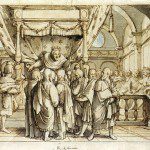![Augustine by Peter Paul Rubens [Public domain or Public domain], via Wikimedia Commons](https://wp-media.patheos.com/blogs/sites/637/2017/03/Peter_Paul_Rubens_-_St_Augustine-199x300.jpg)
Through his work, Augustine showed that the history of Rome was a history of vain, violent, and cruel people. This can be seen in the way Romans often turned their cruelty to each other when they had no external enemy which they could use as the object of their scorn. There were, to be sure, some who tried to live their life with more moral credibility, those who sought to live a life of virtue, many of which became famous because of their extraordinary deeds. Nonetheless, they were the exceptions to the rule. The general populace would always return to vice when they had no external threat forcing them to restrain their urges. The tales and legends of the gods, seen in the theatre, only helped perpetuate such immorality as the actions of their gods shaped the way Romans saw reality. For if the gods were believed to act according to inordinate passions, why would anyone believe it to be bad to imitate them? Even if some Romans criticized the portrayal of the gods on stage, they did not take their critique to the gods themselves, and so even those who seemed to have a more critical sense of the problems facing Roman society and where immorality was being spread, seemed to do nothing to override the foundations of such immorality, as they turned to the same gods and gave them the same benefit of doubt which the rest of the public did.
This, then, was a part of Augustine’s critique of ancient Rome. It was fallen. Even in its best times, the moral superiority shown was only of relative superiority, and it looked good because of the evil which came before and after it. Moreover, even when Rome was at its best, it still supported itself through much external cruelty, where the good of the city and its supposed moral superiority was established in the bloody wars which Rome fought against its opponents. A sacrifice had to be made to ground the Roman society, and that sacrifice could be seen in the blood wars Rome fought with its external enemies. Because its greatness was based in part upon such great evil, and its preservation rested upon such evil, even at the best of times, Roman society could be shown to be evil, even if it found a way to put on a veneer of moral piety as a way to make itself look good.
Augustine made this point in relation to the conflict between Rome and Carthage. As long as Carthage stood its ground, Rome was restrained. The fighting was cruel, the treatment of the other could be shown to be immoral, the strength of Rome was founded in what it gained from its conflict with Carthage. But there was, nonetheless, a sense of fear, an understanding of the limits of life, and so in Rome itself, the people restrained themselves from many petty vices. Certainly, beneath the surface, the vices remained—avarice, lust, wrath, and the joys of gluttony—all could be found, but they were restrained, as the people understood that they must strengthen themselves against Carthage. It is, as it were, a time of limited self-denial, similar to the way an athlete is willing to give up much of their own life to train for a particular competition. When Carthage fell, so did the need for restraint, and almost immediately, all the vices which had been kept in check showed their true strength and flourished: they had not been routed, they had not been controlled, the appearance of high virtue hid the true nature of the Rome from the Romans, and so they had nothing left to control themselves when the reason for their restraint had been lifted. They did not pursue virtue for the sake of virtue, but rather, for self-preservation, and so they had, in their earthly glory, attained their reward. It was limited. It was all for the sake of temporal gain.
Augustine made this point through the writings of Sallust, who talked about the flourishing of justice in ancient Rome. It existed for a short time, so long as Carthage remained a threat. Once Carthage fell, the true nature of Rome showed itself to the world:
He recalled that between the second and last Carthaginian wars the Roman people lived in the best moral conditions and the greatest harmony. But, he also added that that happy state was not due to a love of justice but to the fear of a precarious peace as long as Carthage stood. It was to hold corruption in check and to preserve good morals that the famous Nasica opposed the destruction of Carthage. He wanted vice restrained by fear. [1]
We can see, in modern days, the same problem remains. So many put on a pretense of morality, and they do so not for the love for justice, but out of fear. They seek an earthly peace, with an earthly glory, but ignore the reason why such virtue is important and should be promoted. It should not be done out of fear, but out of a love of justice. When it is fear based, people will be shaped by that fear, and not really follow true justice; they will only hide their vices instead of fight against them, and in the end, all that was unnaturally restrained will be let loose and bring great destruction in their wake. Those who promoted an artificial moral superiority for the United States against the Soviet Union show the truth of this, for once the Soviet Union fell, so did their own moral superiority, and slowly they brought to the United States the very evils they denounced in the Soviet Union: injustice through legalism, control of the media as the only official source of news allowing for the truth to be denounced as fake, and an elite ruling class which lives a life of luxury while using populist rhetoric to get the other classes of people fighting against each other – all these, and more, can be found in the wake of the victory of the United States against the Soviets.
What is true in nations, is also true individually. We must remember that justice is to be loved as a good, and likewise, any and all virtues should be loved similarly. Certainly, when we begin our spiritual walk, often it is out of fear that we act as we do; there is, to be sure, some good practices and habits which we can develop at that time, but we must transcend the foundation of fear, if we want them to be effective and truly root out the vices from within. Otherwise, once we find such fear vanishing in us, for one reason or another, we will see what we have buried deep within us coming out, showing who and what we truly are – selfish sinners seeking our own limited good at the expense of all others. We will have not grown to love virtue, but rather, to hate what we fear, and so when what we fear seems to be put in check, such as material want through material wealth, it is no surprise we become vainglorious and cruel as we enjoy the luxuries of life as others suffer in misery.
If we loved justice, we would not have become like the people of Sodom and Gomorrah, but rather we would have looked after the common good and seen the welfare of our neighbor is a good which must be affirmed. Alas, it is clear that we in the United States have not learned the lesson of history. We rejoice in our luxury. We let our vices run rampant. It is only time before this disorder collapses upon itself. When it does, we only have ourselves to blame.
[1] St. Augustine, City of God: Books I-VII. Trans. Demetrius B. Zema, SJ and Gerald G. Walsh, SJ (New York: Fathers of the Church, 1950), 99 – 100.
Stay in touch! Like A Little Bit of Nothing on Facebook:
A Little Bit of Nothing













